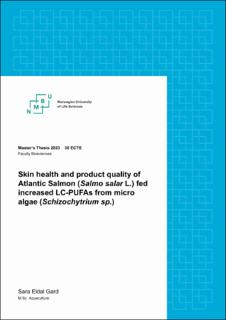Skin health and product quality of Atlantic Salmon (Salmo salar L.) fed increased LC-PUFAs from micro algae (Schizochytrium sp.)
Master thesis
Permanent lenke
https://hdl.handle.net/11250/3096542Utgivelsesdato
2023Metadata
Vis full innførselSamlinger
- Master’s theses (BioVit) [348]
Sammendrag
The Atlantic salmon is a valuable protein source that can increase food security for the growing world population. However, there is an urgency of novel sustainable ingredients to support production growth in the Aquaculture industry. Micro algae have the potential to replace fish oil in Atlantic salmon feed. It is a viable source, rich in n-3 LC PUFA. The heterotrophic micro algae studied in this thesis, Schizochytrium sp. is sustainable and efficient to cultivate. The micro algae has high EPA (C20:5n-3) and DHA (C22:6n-3) content and studies show diets with Schizochytrium sp. result in improved EPA+DHA retention efficiency. This study investigated the effects of dietary modifications on skin health, product quality (fillet pigmentation) and nutritional quality of Atlantic Salmon. The three test diets consisted of control diet, resembling commercial (7.5% EPA+DHA, FO) feed, test diet 1 containing increased levels of n-3 LC-PUFA from marine sources (10% EPA+DHA, FO) and test diet 2 with increased levels of n-3 LC-PUFA supplemented with Schizochytrium sp. (algae oil, AO) (5% FO+5% AO). The test feeds were given to the Atlantic salmon in artic farming environment in Hammerfest, Finnmark in triplicate commercial sea-cages from October 22nd. The sampling period for this thesis were from November 2022 and April 2023. The result showed an overall positive development on bodyweight for all diet groups, indicating no negative effects of micro algae inclusion. And fish fed with control diet, diet 2 and diet 2 had similar trends in biometric traits. The test feed had no significant effect on skin health or fillet pigmentation. The chemical composition of the fillets showed increased level of oleic acid, linoleic acid and DHA in salmon fed diet supplemented with micro algae. Diet with increased n-3 LC PUFA had the highest level of EPA in the salmon fillet. Astaxanthin was not affected by the modified diets, but had a positive development.
